A gardening expert has detailed how using dish soap on your lawn can effectively tackle moss and leave your garden looking greener and healthier.
Tom Monson from Monson Lawn and Landscaping told Homes and Gardens that mixing two ounces of dish soap with a gallon of water and pouring onto your lawn will kill off moss without damaging your grass.
However, it is best to try and catch the moss early as this is when it is most effective.
He said: 'Killing moss without decimating your grass can be tricky, but a dish soap solution can make it look easy with a little care and attention.”

For small to average-sized lawns, Tom recommends using two ounces of soap and a gallon of water, and for bigger gardens, increase that to two gallons of water for every 1,000 square feet of grass.
Use a sprayer to cover the grass with the water, and then wait a day to let the soap work its magic.
Then, use any household tool of your desire to scrape away the dead moss, and if there has been any damage to other areas of your garden, it may be worth planting new grass seeds.
By planting new seeds you can maintain your garden while still getting rid of any moss.

If this method isn’t for you, there is also another similar method involving baking soda.
Mixing two gallons of water with a small box of baking soda - following the same method on your lawn will have a similar effect, but not as quickly.
The best preventative measure for moss is to rake it in early spring before the moss produces spores and begins to spread.
According to Love The Garden, if your grass has moss then the lawn is already weak or stressed. Moss can out-compete the grass and cause it to die out.
Moss can be avoided to some extent if air circulation is improved, which can be done by pruning overcrowded areas and removing extra vegetation.

Also, improving the quality and condition of soil will have a massive impact on how the grass grows.
Watering regularly and mulching when necessary improves the health of the soil, and the application of a foliar feed can improve strength.
Other issues that can stunt your grass' growth are incorrect or irregular mowing, the soil beneath being too compacted, and not enough sunlight.







